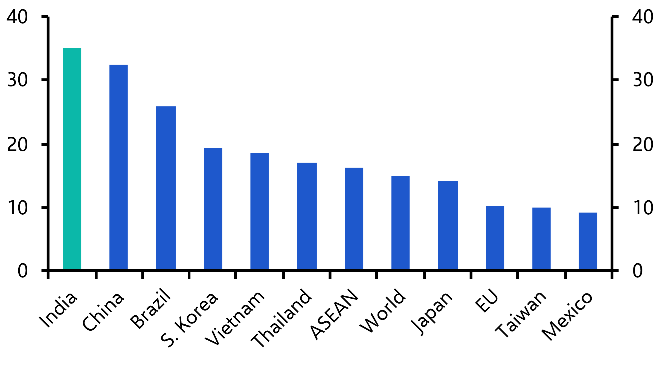In my note last week I sketched out a comparatively bright outlook for the global economy over the long run. In contrast, the economic outlook for next year is rather more challenging – and this is likely to have significant implications for financial markets.
We published our key calls for 2019 last week – you can find a copy in the usual place on our website. In addition, we also published a deeper look at the prospects for emerging markets (see here). I won’t rehash either note here, but it’s worth highlighting some of the key themes.
The main point to emphasise is that we expect the global economy to slow next year, and by more than most currently anticipate. This slowdown will be led by the US, where a combination of tighter monetary policy and the fading effects of this year’s fiscal stimulus will start to drag on activity. We also expect growth in China to slow, despite additional stimulus from the People’s Bank. And Europe’s economy is likely to weaken too, with Italy flirting with recession. All told, we think that global GDP growth will slow from 3.7% in 2018 to around 3.3% in 2019 and to below 3% in 2020. That might not sound very dramatic but, if we’re right, global growth in 2020 would be the third weakest of any year since 2000.
Given the backdrop of weaker US growth, we think that the Fed is now close to the end of its tightening cycle. We expect two interest rate hikes in 2019 (following a hike this week), but we then expect US policymakers to cut rates in 2020 in order to shore up the economy. The ECB stuck to its script at last week’s meeting and indicated that it would leave rates on hold “at least through the summer” of next year. But it wouldn’t be a total surprise if a softer economy derailed their plans. In fact, I think there’s a real possibility that the ECB fails to raise interest rates at all in the coming years.
It won’t surprise you to hear that we expect political developments to remain a major theme in markets next year. In the UK, my hunch is that a combination of fudge and delay will mean that we will avoid a “no deal” Brexit – but at the expense of prolonging the uncertainty for businesses and investors over the shape of our future relationship with Europe. Meanwhile, if we’re right that the US economy slows, it’s difficult to see President Trump damping down his protectionist rhetoric, particularly as the primaries for the 2020 election get underway. Indeed, there is a good chance that we shift from a US-China trade war, centred on tariffs and trade balances, to a US-China tech war, centred on intellectual property, industrial strategy and national security.
All of this is likely to produce a difficult environment for risky assets. In a note published earlier this month our markets team found that, for the first time in at least 25 years, real returns across ten major asset classes were likely to be negative this year. We expect global equity markets to struggle again next year, with US stocks likely to experience the steepest declines. Credit spreads are likely to widen too. But, if we’re right about the Fed, it should at least be a better year for investors in US government bonds. And the dollar’s strength may also start to wane (at least against developed market currencies).
Yogi Berra said that “it’s dangerous to make predictions – especially about the future”. That’s true. But stepping back, my sense is that the final few months of 2018 have set the tone for what is likely to follow in much of 2019. A rocky road lies ahead.
This is the last Chief Economist’s note for 2018. Thanks to all of you that have sent thoughts and feedback – do keep your comments coming. In the meantime, I’d like to wish all of our readers a happy holiday season and a prosperous new year. See you in 2019!
In case you missed it:
(Requires login)
- Our US team sets out its forecasts for America’s economy in its latest US Economic Outlook.
- Our Markets Economist, Oliver Jones, takes a deeper look at the prospects for EM equities.
- Our Senior India Economist, Shilan Shah, worries about recent developments at the RBI.



